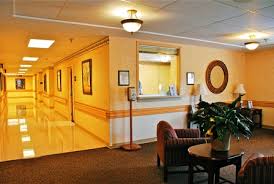Motor learning research evidence to support the HandTutor system, glove and dedicated rehabilitation software, method of and Physical and Occupational Therapy training for arm and hand functional ability improvement.
Thursday, 14 June 2012
When Skilled Nursing Care is Needed
Once a patient completes his stay in an acute hospital the next step is to decide if he can go home and receive the care he needs there or whether he is better off in a nursing home or rehabilitation facility. Sometimes recovery at home will be slower than if the patient goes to a professional follow up care facility.
The choice to return home or not may be based on the following criteria:
Can the patient receive the care needed at home by family, friends or other caregivers?
Can the patient maneuver from and to a bed and chair without much help?
Can the patient walk around enough to be able to get to the bathroom and back?
If necessary, can the patient go up and down the stairs independently?
Can he prepare food and feed himself?
In short, is the patient able to take care of himself sufficiently or is more assistance needed?
Other factors which come into play are the illnesses that exist and whether the patient can take his own medicine correctly, care for any wounds and how mobile he is. Depending on the original reason for the hospitalization a nursing facility can assist with post acute care for knee, hip or shoulder surgery; stroke or brain injury care and other professionally needed assistance for the hospitalization.
A good skilled nursing facility is stocked with all kinds of equipment to facilitate the rehabilitation of its patients. the patients and their caregivers or family should visit several that are located in the area desired ahead of time to see if they are clean and cared for, have any undesirable odors, seem to be staffed adequately and in general have a good reputation.
The care that is provided by a skilled nursing facility includes: periodic visits by the patient’s physician, trained health professionals that will administer rehabilitation, wound care, medication administration, social workers to see that everything necessary is being done and to prepare for aftercare, therapists to teach ADLs, speech and language specialists, if necessary and any other professionals needed to pave the way for a return home.
If physical therapy is needed then the best equipment should be available. This may include the TUTOR system for patients that suffered a stroke or other limb debilitating injury or disease. The TUTORs are physical therapy products that are used as solutions for patients who have had a stroke, Parkinson’s, CP, MS, brain/spinal cord injuries, radial and Ulnar nerve injuries, development disorders, Brachial Plexus injuries or other upper or lower limb surgeries that cause paresis of a limb.
The TUTOR system which consists of the HANDTUTOR, ARMTUTOR, LEGTUTOR and 3DTUTOR are comfortable ergonomic gloves or braces that implement an impairment based rehabilitation program with augmented feedback and encourage motor learning. This is accomplished through exclusive software that allows the therapist to evaluate, objectively quantify and record the patient’s impairments. Currently in use in leading U.S. and European hospitals and rehabilitation clinics the TUTOR system is also available in patient’s homes through the use of telerehabilitation. The TUTORs are available for use by children as well as adults and are fully certified by the FD and CE. See WWW.MEDITOUCH.CO.IL for more information.

Subscribe to:
Post Comments (Atom)
No comments:
Post a Comment